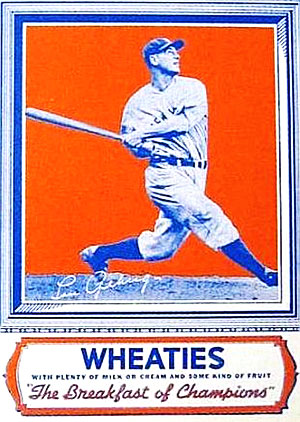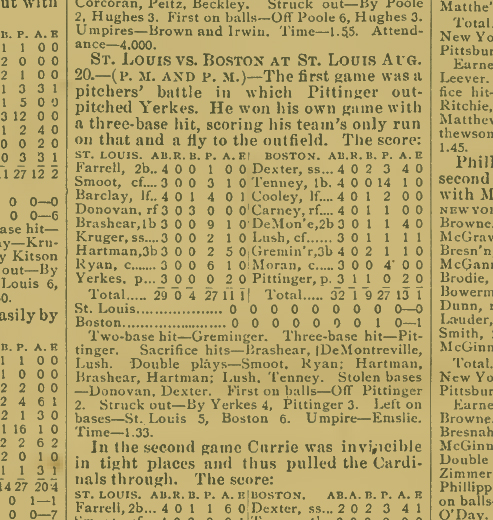Historical Hitters August 20: Lou Gehrig & Togie Pittinger

On this day in 1938 the Iron Horse hits his 23rd grand slam home run. This record stood until A-Rod broke it with 24 in 2013.
The game was a one-sided event with the Yanks having no trouble beating the A’s 11-3 in Philadelphia.
In 1934, Lou was also the first athlete to be on a Wheaties box.

[divider]
 On this day in 1902, the pitcher was also the hitting hero of the game. In St. Louis the old Boston Beaneaters (now the Atlanta Braves) beat the St Louis Cardinals 1-0. The hero was the old Beaneater, Togie Pittinger, who hit an 8th inning triple and score on a fly ball to the outfield. Pittinger won 27 games that year which is the Braves “modern era” record- since 1902.
On this day in 1902, the pitcher was also the hitting hero of the game. In St. Louis the old Boston Beaneaters (now the Atlanta Braves) beat the St Louis Cardinals 1-0. The hero was the old Beaneater, Togie Pittinger, who hit an 8th inning triple and score on a fly ball to the outfield. Pittinger won 27 games that year which is the Braves “modern era” record- since 1902.
What makes this remarkable is that he career OPS+ was -16 and his batting WAR was -5.9. This triple was the only one in his career.
Here is the box score for his career day.

This game was a highlight for a player whose illness and personal tragedies would dissolve any positive feelings held by the Boston front office or Boston media. Togie Pittinger was a diabetic in an era where he or society could not cope with the disease – insulin was not discovered as a treatment until the early 1920’s.
Pittinger is of note for a pair of reasons with the club: one great and one terrible. In 1902 he was 27-16 and in 1903 he went south with a record of and leading the National League in five negative pitching statistical categories: Losses, earned runs allowed, hits allowed, home runs allowed, and walks allowed. He was second worst in errors committed and third worst in wild pitches. Thanks to the number of innings pitched, almost 400, his WHIP went from a 1.252 only to 1.533.
For this Pittinger is perhaps the poster child of management, media, and the fans turning on a player quickly. It’s a good thing twitter or sports talk radio was not around in 1903-04. In 1902 Togie was the toast of the town. By 1903 he was the reason for the team’s woes. His SABR Bio outlines the drama and painful angst that ensued during the 1903 and 1904 seasons.
As a response to the arrival of the upstart Boston Americans, the more established Boston Nationals overpaid their key players to keep them.
Pittinger signed for an unheard of number of $4000 per year for a two year deal. His experience is an early case study of what happens to players the year after they sign a big money contract. When things go bad, they really go bad.
In 1902 he was called one of the best pitchers in the country, in Sporting Life.
In 1903 his batting was so poor, that media reports noted that “(W)hen Pittinger makes a base hit, it’s time to give the offending twirler a notice of his release.”
Additionally, his eldest daughter died during the 1903 season. It was a horrible year.
By 1904 the gloves were off and it was a contentious season. He missed games Boston Management called him petulant and a spoiled child.
He still pitched 355 innings lead the league in walks, but gave up only one home run which gave him the best HR/9 innings ratio of the year at a 0.0. His WHIP improved to 1.318 but his record declined as the team’s performance did to 15-21.
After all the acrimony in Boston he was finally traded at the end of 1904 season.
He had one good year with the Phillies, but the ravages of diabetes were too much and took their toll. The clubhouse and off the field issues were still apparent and by 1907 he was out of baseball. By January 1909 he died.
Sources:
Sporting Life Magazine box score
Baseball-refereence.com
SABR Biography Project
